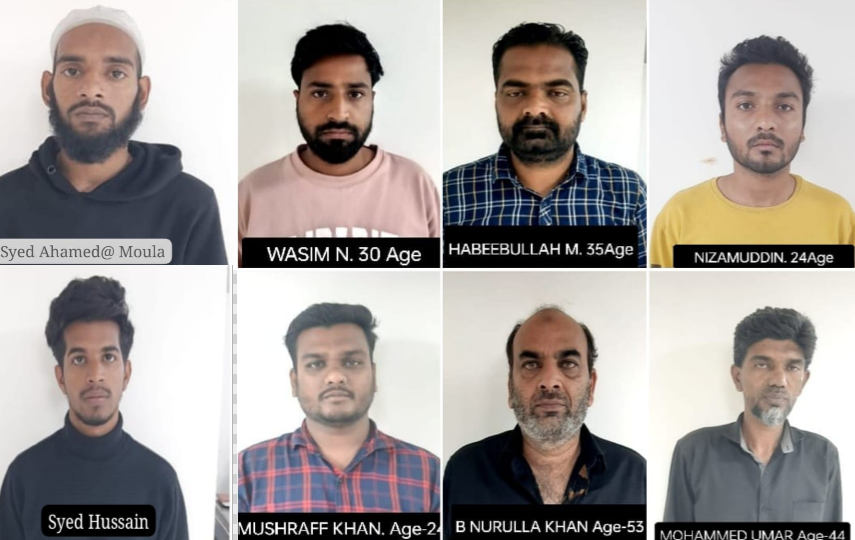More than 2,000 cases are being registered each month by the Cyber, Economic, and Narcotics crime police stations in Karnataka.

The eight arrested accused in the courier scam
With cyber criminals employing innovative methods to con people, the Bengaluru city police have scaled up their capacities to detect such crimes and bring the perpetrators to book.
Each police division in the city has been directed to form a Special Investigating Team (SIT) to probe various complaints of cybercrime and FIRs registered across Karnataka.
More than 2,000 cases are being registered each month by the Cyber, Economic, and Narcotics (CEN) crime police stations in the state, and the volume of unsolved cases has turned into a challenge for the police, since the suspects are often thousands of kilometres away from the jurisdictional boundaries.
Elaborating on the work strategy, Deputy Commissioner of Police (Traffic) East Division Kuldeep Kumar Jain told South First that each of the three traffic police divisions’ DCPs have been instructed to form SITs to probe into different types of cybercrimes.
“For example, the Traffic (East) division has been assigned to probe the FedEx courier scams while the Traffic (South) division has been asked to follow up the job fraud cases,” he explained.
“The traffic (North) division has been directed to investigate sextortion cases and the Northeast police division would focus on cases related to Aadhaar-enabled Payment System (AEPS),” Jain said, adding that all the other police divisions in the city, too, have been investigating various types of cybercrimes.
“With this strategy, we can engage in minute-level monitoring constantly which ends up not only in nabbing the culprits but also in capacity-building measures in detecting and busting similar other crimes,” he added.
The police strategy has paid off. The North division cybercrime police on 1 December arrested an eight-member gang that was operating a “courier racket“ online. The police recovered ₹13.17 lakh and 11 mobile phones from the accused, besides freezing around 148 bank accounts.
The “courier scam” is one of the new modus operandi of cybercriminals.
In the guise of courier executives, they would call up random people, and say a packet with drugs had been couriered to them from one of the Asia-Pacific countries. They would also inform their victims that the Mumbai Crime Branch has registered a case against them.
Soon after the victim was made to believe that the consignment contained drugs, the conmen would inform that their bank accounts have been used for money laundering.
The conmen would then demand the bank details such as PINs and OTPs for checking the bank accounts, pretending to be Mumbai police officers. The communication would be via video calls, and “FIR copies”, too, would be forwarded to the victims.
Once they got the details, they would be asked to transfer money if they wanted the cases to be quashed.
The North division police busted the “courier scam” racket and arrested eight people — Waseem N (30), Habeebullah M (35), Nizamuddin (24), Mushriff Khan (24), B Nurulla Khan (53), Mohammed Umar (44), Syed Ahmed alias Moula, and Syed Hussain.
Using this modus operandi, the accused duped a homemaker in Yeshawanthpura and forced her to transfer ₹1.08 crore from her account. Based on her complaint, a police team led by DCP North Division Saidulu Adawath and Inspector Shivaratna S, tracked down the account transaction and found that the accused had withdrawn cash at an RBL bank branch in Davangere in Karnataka.
The police then obtained the CCTV footage to identify the accused and arrested them from Davangere.
Investigations revealed that apart from two cases reported in the North division, the accused were also involved in more than 75 cases registered across the country.

May 13, 2024

May 11, 2024

May 09, 2024

May 08, 2024

May 07, 2024

May 05, 2024